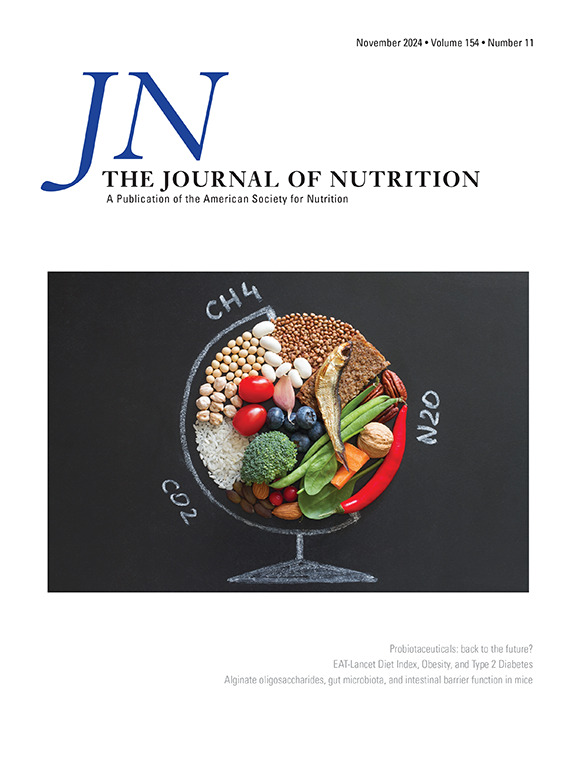初步证据表明,长期食用高蛋白早餐可促进与青少年心脏代谢健康相关的某些 miRNA 的高表达。
IF 3.7
3区 医学
Q2 NUTRITION & DIETETICS
引用次数: 0
摘要
背景:早餐中增加膳食蛋白质可促进心脏代谢健康;然而,这些改善是否发生在分子水平尚不清楚:目的:研究长期食用不同蛋白质量的早餐是否会改变 "不吃早餐 "的青少年与心脏代谢健康相关的循环 miRNAs 的表达:30名青少年(年龄:19±1岁;体重指数:25.4±3kg/m2)完成了一项为期6个月的严格控制早餐试验,参与者在6个月内食用350千卡正常蛋白质(NP,10克蛋白质)或高蛋白质(HP,30克蛋白质)早餐,或继续不吃早餐(BS)。研究人员在基线(PRE)和6个月(POST)时采集空腹血液样本,以评估12种先验循环血浆miRNA表达水平(RT-qPCR)、葡萄糖、胰岛素、白细胞介素-6和C反应蛋白:任何 miRNA 都没有观察到组间的主要效应;但在 miR-126-3p 的表达方面,发现了时间与组间的交互作用(P = 0.05)。在整个研究过程中,HP 早餐往往会增加 miR-126-3p 的表达(POST-PRE,P=0.09),与 BS 相比,POST 的表达更高(P=0.03),而 NP 早餐则不会。此外,几种 miRNA 预测了 IL-6 的空腹浓度:miR-320a-3p、-146a-5p、-150-5p、-423-5p、-122-5p;葡萄糖:miR-24-3p、-126-3p;胰岛素:miR-24-3p、-126-3p:miR-24-3p、-126-3p、-15b-5p;胰岛素敏感性:miR-24-3p、-126-3p、-199a-5p、-15b-5p;β 细胞功能:miR-15b-5p(R2 介于 0.2-0.39;PC 结论:这些数据支持每天食用高蛋白早餐,以促进心脏代谢健康,这可能是通过 miRNA 表达的变化实现的:临床试验编号:NCT03146442。本文章由计算机程序翻译,如有差异,请以英文原文为准。
Preliminary Evidence Supports that Long-Term Consumption of Higher-Protein Breakfast Promotes Higher Expression of Select miRNA Associated with Cardiometabolic Health in Adolescents
Background
Increased dietary protein at breakfast promotes cardiometabolic health; however, whether these improvements occur at the molecular level is unknown.
Objectives
The objective was to examine whether long-term consumption of breakfast, varying in protein quantity, alters the expression of circulating microRNAs (miRNAs) associated with cardiometabolic health in “breakfast-skipping” adolescents.
Methods
Thirty adolescents (age: 19 ± 1 y; body mass index: 25.4 ± 3 kg/m2) completed a 6-mo tightly controlled breakfast trial in which participants consumed 350 kcal normal-protein (NP, 10 g protein) or higher-protein (HP, 30 g protein) breakfasts or continued to BS for 6 mo. Fasting blood samples were collected at baseline (PRE) and 6 mo (POST) for assessment of 12 a priori circulating plasma miRNA expression levels (real-time quantitative polymerase chain reaction), glucose, insulin, IL-6, and C-reactive protein.
Results
No main effects of group were observed for any miRNAs; however, a time-by-group interaction was detected for the expression of miR-126-3p (P = 0.05). HP breakfast tended to increase miR-126-3p expression throughout the study (POST-PRE, P = 0.09) leading to greater expression at POST compared with BS (P = 0.03), whereas NP breakfast did not. Additionally, several miRNAs predicted fasting concentrations of IL-6: miR-320a-3p, -146a-5p, -150-5p, -423-5p, -122-5p, glucose: miR-24-3p, -126-3p; insulin: miR-24-3p, -126-3p, -15b-5p; insulin sensitivity: miR-24-3p, -126-3p, -199a-5p, -15b-5p; and β-cell function: miR-15b-5p (R2 between 0.2 and 0.39; P < 0.05) from PRE and POST samples across groups.
Conclusions
These data support the daily consumption of a HP breakfast to promote cardiometabolic health, potentially through changes in miRNA expression, in a sensitive life-stage where early intervention strategies are critical to reduce the risk of adult-onset chronic disease.
Trial registration number
NCT03146442.
求助全文
通过发布文献求助,成功后即可免费获取论文全文。
去求助
来源期刊

Journal of Nutrition
医学-营养学
CiteScore
7.60
自引率
4.80%
发文量
260
审稿时长
39 days
期刊介绍:
The Journal of Nutrition (JN/J Nutr) publishes peer-reviewed original research papers covering all aspects of experimental nutrition in humans and other animal species; special articles such as reviews and biographies of prominent nutrition scientists; and issues, opinions, and commentaries on controversial issues in nutrition. Supplements are frequently published to provide extended discussion of topics of special interest.
 求助内容:
求助内容: 应助结果提醒方式:
应助结果提醒方式:


